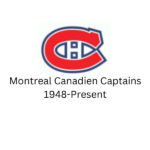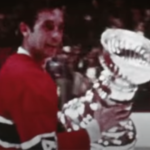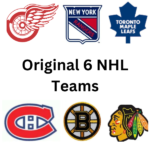In the annals of hockey history, there are lines that will never be forgotten.. The legendary Montreal Canadiens “Punch Line” of the 1940s, composed of Maurice Richard, Toe Blake, and Elmer Lach, is one such iconic trio. And they were no joke!!! These three Hall of Fame players were the driving force behind the Montreal Canadiens’ successes during that era. Let’s have a look into the remarkable stats and captivating tidbits that defined the legendary “Punch Line.”
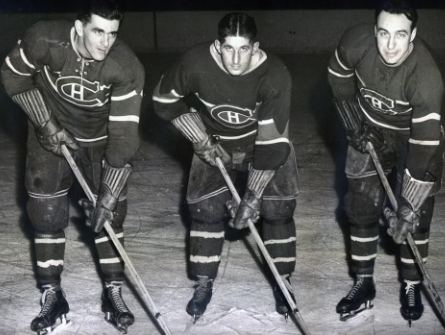
The Legendary “Punch Line”
Maurice “Rocket” Richard
Richard: Maurice Richard, affectionately known as the “Rocket,” was the heartbeat of the “Punch Line.” With a blend of speed, skill, and an unmatched scoring touch, Richard became one of the most celebrated players in NHL history. His ability to fire the puck at astonishing speeds earned him the nickname “Rocket,” and it was well-deserved.
Stats:
- Career NHL goals: 544
- NHL All-Star appearances: 14
- Stanley Cups with the Canadiens: 8
Tidbit: The “Richard Riot” was a significant incident that occurred in Montreal on March 17, 1955, following a game between the Montreal Canadiens and the Boston Bruins. The riot was sparked by a series of events involving Maurice “Rocket” Richard, the star player of the Canadiens, who was a beloved and iconic figure in Montreal.
The Incident: During the game on March 13, 1955, between the Canadiens and the Bruins, Maurice Richard was involved in an on-ice altercation with Boston’s Hal Laycoe. Laycoe had been roughing up Richard throughout the game, and at one point, he delivered a high stick to Richard’s head, resulting in a cut above his eye.
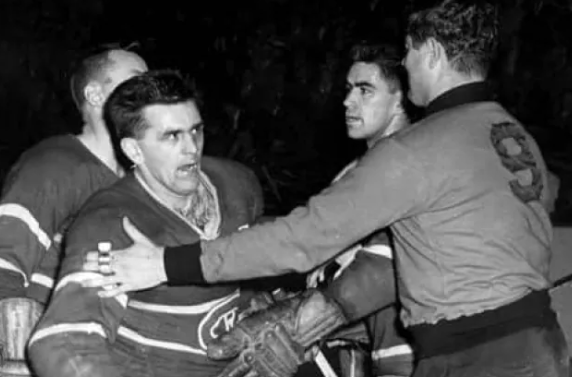
In a fit of frustration, Richard retaliated and attacked Laycoe with his stick. Linesman Cliff Thompson attempted to contain Richard and Richard punched him twice in the face, knocking him out. Richard was given a match penalty and an automatic $100 fine. The altercation led to both players being ejected from the game. However, the consequences did not end there. NHL President Clarence Campbell, who had been present at the game, decided to impose a harsh punishment on Richard for his actions.
The Suspension: On March 16, 1955, Campbell announced that Maurice Richard would be suspended for the remainder of the regular season (three games) and the entire Stanley Cup playoffs. This decision was met with outrage by the Montreal fans, who saw Richard as a symbol of the city and the Canadiens’ pride.
The Riot: On the night of March 17, 1955, the Canadiens were playing against the Detroit Red Wings at the Montreal Forum. The tension in the city was palpable, and emotions were running high. As the game progressed, the Canadiens were losing 4-1 to Detroit. The crowd was already frustrated and disappointed due to the absence of their hero, Richard. The fans were also mad at Clarence Campbell for having the audacity to show up to the game after suspending Richard.
In the third period, the tension exploded. A group of fans started throwing various objects onto the ice in protest of Richard’s suspension. With a few minutes left in the game, a tear gas canister was thrown from the stands, filling the arena with noxious fumes. The game had to be suspended, and players rushed off the ice to safety.
The Aftermath: The “Richard Riot” resulted in significant damage to the Montreal Forum and surrounding areas. More than 37 people were injured, and over 100 arrests were made. The riot was a reflection of the deep connection between the people of Montreal and their hockey team, as well as the immense passion they had for Maurice Richard.
In the aftermath of the riot, the NHL eventually lifted Richard’s suspension for the playoffs, and he returned to lead the Canadiens to a memorable Stanley Cup victory that year. The events of the “Richard Riot” have since become an indelible part of hockey lore, and Maurice Richard’s legacy as an icon of the sport and the city of Montreal has endured through the ages.
Toe Blake:
The smooth-skating and intelligent forward, Toe Blake, complemented Richard’s offensive prowess perfectly. Blake was known for his playmaking ability, setting up countless goals for his linemates while displaying a tireless work ethic on the ice.
Stats:
- Career NHL points: 589 (including 235 goals and 354 assists)
- NHL All-Star appearances: 8
- Stanley Cups with the Canadiens: 8 (as a player) and 5 (as a coach)
Tidbit: After retiring as a player, Toe Blake became one of the most successful coaches in NHL history. Under his guidance, the Canadiens won five Stanley Cups in the 1950s, solidifying his legacy as a key figure in the franchise’s history.
Elmer Lach:
Elmer Lach, the centerman of the line, was the unsung hero, often overshadowed by the flamboyant Richard. Nonetheless, his exceptional playmaking skills and defensive acumen made him an indispensable part of the “Punch Line.”
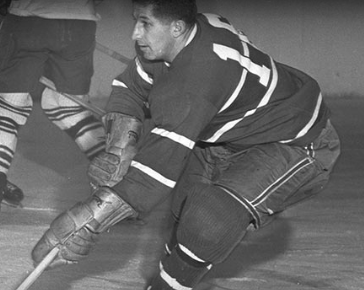
Stats:
- Career NHL points: 623 (including 215 goals and 408 assists)
- NHL All-Star appearances: 3
- Stanley Cups with the Canadiens: 3
Tidbit: Elmer Lach, a pivotal figure in the storied history of the Montreal Canadiens, was a centerman renowned for his playmaking abilities and unwavering dedication to the game. He joined the Canadiens in the 1940s and quickly established himself as a vital cog in the team’s success. Often overshadowed by the more flamboyant Maurice “Rocket” Richard, Lach’s unselfish style of play made him the perfect center for the “Punch Line.” His hockey intelligence and impeccable passing skills earned him the nickname “The Phantom” for his ability to seemingly appear out of thin air with the puck.
Lach’s contributions were integral to the Canadiens’ three Stanley Cup victories in 1944, 1946, and 1953. Despite facing numerous injuries throughout his career, he displayed unparalleled resilience, leading the league in scoring during the 1952-1953 season despite suffering a broken jaw. After retiring as a player, Elmer Lach remained with the Canadiens organization, serving as a scout and a respected mentor to young players. Inducted into the Hockey Hall of Fame in 1966, Elmer Lach’s impact on the sport and the Montreal Canadiens continues to be remembered and celebrated to this day.
Conclusion: The “Punch Line” of Maurice Richard, Toe Blake, and Elmer Lach remains an enduring symbol of greatness in the history of the Montreal Canadiens. Their individual talents and remarkable chemistry on the ice were instrumental in delivering multiple Stanley Cup victories for the franchise. Even today, their legacy continues to inspire players and fans alike, reminding us of the golden era of hockey and the heroes who made it unforgettable.
Thanks for your time. Please leave suggestions and comments below.

